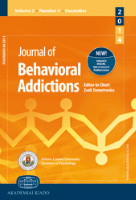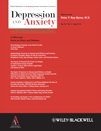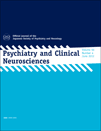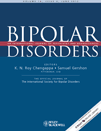
Journal of Behavioral Addictions
Scope & Guideline
Illuminating the Pathways of Behavioral Addictions
Introduction
Aims and Scopes
- Behavioral Addiction Research:
The journal publishes studies that explore various forms of behavioral addictions, including but not limited to internet gaming, gambling, smartphone use, and compulsive sexual behavior. It seeks to understand the underlying psychological, social, and biological mechanisms that contribute to these conditions. - Clinical Implications and Treatment Approaches:
Research that evaluates treatment methodologies and interventions for behavioral addictions is a key focus. The journal highlights empirical studies, meta-analyses, and clinical trials that assess the effectiveness of therapeutic approaches, including cognitive-behavioral therapy, mindfulness interventions, and pharmacological treatments. - Neurobiological Underpinnings:
The journal features studies that investigate the neurobiological correlates of behavioral addictions, utilizing advanced imaging techniques and neuropsychological assessments. This includes research on brain structure and function in relation to addictive behaviors. - Cultural and Societal Perspectives:
The journal emphasizes the importance of cultural and societal factors in understanding behavioral addictions. It encourages research that examines how different cultural contexts influence the prevalence, perception, and treatment of behavioral addictions. - Risk Factors and Prevention Strategies:
Research focusing on identifying risk factors associated with the development of behavioral addictions is integral to the journal. It also highlights studies that propose and evaluate prevention strategies aimed at reducing the incidence of these disorders.
Trending and Emerging
- Impact of COVID-19 on Behavioral Addictions:
Research exploring the effects of the COVID-19 pandemic on behavioral addictions has surged. Studies investigate how lockdowns and increased screen time have exacerbated issues such as internet gaming disorder and smartphone addiction. - Technological Influences on Addiction:
There is a growing body of literature examining how technological advancements, such as social media, online gaming, and gambling apps, contribute to addiction behaviors. This includes investigations into specific features that enhance engagement and potential addiction. - Neuroscientific Approaches to Understanding Addictions:
Emerging research utilizing neuroimaging and electrophysiological methods is on the rise. These studies aim to elucidate the brain mechanisms underlying various behavioral addictions, providing insights into treatment and intervention strategies. - Cultural Contexts of Behavioral Addictions:
There is an increasing emphasis on cultural and contextual factors influencing behavioral addictions. Researchers are exploring how cultural norms, societal pressures, and familial influences shape the prevalence and treatment of addiction behaviors. - Intersection of Behavioral Addictions and Mental Health:
Recent publications highlight the co-occurrence of behavioral addictions with mental health issues, such as anxiety, depression, and ADHD. This trend underscores the importance of integrated treatment approaches that address both addiction and mental health.
Declining or Waning
- Traditional Substance Use Comparisons:
Studies that compare behavioral addictions with substance use disorders, particularly in terms of treatment and outcomes, have become less frequent. This shift may indicate a growing recognition of behavioral addictions as distinct entities warranting independent research. - Focus on Non-Digital Addictions:
There has been a notable reduction in papers addressing non-digital behavioral addictions, such as compulsive shopping or exercise addiction. This decline may reflect an increased focus on digital and internet-related addictions, particularly in the context of the COVID-19 pandemic. - Generalized Addiction Models:
Research that utilizes broad, generalized models of addiction without specific focus on behavioral nuances has waned. The journal now favors more nuanced approaches that consider the specific characteristics and contexts of different behavioral addictions. - Longitudinal Studies of Older Populations:
There has been a decrease in longitudinal studies examining behavioral addictions in older populations. This may indicate a shift toward focusing on younger demographics, particularly adolescents and young adults, who are often more susceptible to digital addiction trends.
Similar Journals

Activitas Nervosa Superior Rediviva
Empowering Scholars in the Realm of Nervous System ScienceActivitas Nervosa Superior Rediviva is a peer-reviewed journal dedicated to the fields of neuropsychology, physiological psychology, psychiatry, and mental health research. Published by the esteemed SLOVAK ACADEMY OF SCIENCES, INSTITUTE OF NORMAL AND PATHOLOGICAL PHYSIOLOGY, this journal embraces an open-access model, facilitating the dissemination of critical findings and discussions within these evolving fields. With a focus on innovative studies spanning from 2009 to 2024, it provides a vital platform for researchers and professionals seeking to understand the complexities of the nervous system and related disorders. Although currently classified in the fourth quartile across relevant categories including neuropsychology and psychiatric health, the journal’s commitment to publishing quality research contributes significantly to the ongoing discourse among academics and clinicians alike. Activitas Nervosa Superior Rediviva invites scholars to engage with its content and further strengthen the integration of research and practice in mental health and neurological sciences.

DEPRESSION AND ANXIETY
Innovating research for a brighter mental health future.DEPRESSION AND ANXIETY is a leading academic journal published by WILEY, dedicated to presenting cutting-edge research in the fields of clinical psychology, psychiatry, and mental health. With an impressive impact factor underscoring its prominence—ranked in the top quartile (Q1) for both clinical psychology and psychiatry, and occupying the 7th and 20th ranks in Scopus respectively—this journal serves as a pivotal resource for researchers, professionals, and students alike. Since its inception in 1996 and continuing through 2024, DEPRESSION AND ANXIETY has been at the forefront of disseminating findings that significantly impact our understanding of mental health issues. The journal's rigorous peer-review process ensures the highest quality of published works, making it an essential platform for scholars aiming to advance knowledge and contribute meaningfully to the mental health discourse.

PSYCHIATRY AND CLINICAL NEUROSCIENCES
Bridging Theory and Practice in Psychiatry and NeurosciencesPSYCHIATRY AND CLINICAL NEUROSCIENCES is a leading journal in the fields of psychiatry and clinical neurology, published by Wiley. With a commendable impact factor and a position within the prestigious Q1 quartile across multiple relevant categories—including Medicine (Miscellaneous), Neurology, and Psychiatry and Mental Health—this journal stands out for its rigorous peer-reviewed content that addresses critical issues in mental health and neurological disorders. Established in 1933, the journal has a rich history of contributing impactful research that guides both clinical practice and academic inquiry. Although it is not an open-access journal, its high relevance is underscored by its Scopus rankings, with notable percentiles in Psychiatry and Neurology, making it a vital resource for researchers, clinicians, and students looking to stay abreast of the latest advancements. Located in the United Kingdom, PSYCHIATRY AND CLINICAL NEUROSCIENCES aims to bridge the gap between theory and practical application, fostering a comprehensive understanding of the complex interplay between mental health and neurological conditions.

BIPOLAR DISORDERS
Empowering Knowledge for Effective InterventionsBIPOLAR DISORDERS, published by Wiley, is a leading international journal dedicated to advancing the understanding and treatment of bipolar disorders. Since its establishment in 1999, the journal has become a vital resource in the fields of Biological Psychiatry and Psychiatry and Mental Health, currently ranked in the Q2 category for Biological Psychiatry and Q1 for Psychiatry and Mental Health as of 2023. With impressive Scopus rankings, it stands at 75th out of 567 in Psychiatry and Mental Health and 11th out of 51 in Biological Psychiatry, reflecting its influential role in shaping mental health research. The journal not only focuses on empirical studies, reviews, and clinical reports but also encourages innovative methodological advancements in understanding bipolar disorders. Although it does not offer Open Access, its extensive coverage from 1999 to 2024 ensures that practitioners, researchers, and students have access to a wealth of knowledge critical for the development of effective therapeutic interventions. For those engaging with cutting-edge research in psychiatric care, BIPOLAR DISORDERS serves as an essential platform for knowledge dissemination and academic discourse.

ADDICTION
Connecting research with clinical excellence in addiction.ADDICTION, published by Wiley, is a highly regarded academic journal that serves the vibrant fields of Medicine and Psychiatry and Mental Health. With an impressive impact factor reflective of its significance—ranking in the top 8% and 7.5% of its categories respectively—this journal is esteemed for its rigorous peer-reviewed research which spans a wide array of topics related to addiction, including pharmacology, prevention, and treatment modalities. Since its inception in 1993, ADDICTION has continually provided a platform for innovative research, shaping the discourse and influencing clinical practices worldwide. This journal, based in the United Kingdom at a prestigious location in Hoboken, NJ, stands as a beacon for researchers, practitioners, and students alike, committed to advancing understanding and strategies to combat addiction-related challenges. Although it is not an Open Access publication, the journal's contribution to the field remains invaluable, ensuring that cutting-edge findings are disseminated widely among professionals dedicated to improving mental health outcomes.

ADDICTIVE BEHAVIORS
Unraveling the Complexities of AddictionADDICTIVE BEHAVIORS is a prestigious journal published by PERGAMON-ELSEVIER SCIENCE LTD, specializing in the critical examination and exploration of addiction-related issues across diverse fields including Clinical Psychology, Psychiatry and Mental Health, and Toxicology. With a robust history dating back to 1975 and convergence extending to 2024, the journal is esteemed for its rigorous peer-reviewed research that contributes significantly to understanding addiction phenomena. Ranked in the Q1 category for its focus areas, it stands out within the academic community, evidenced by its impressive Scopus rankings—25th in Clinical Psychology and 14th in Toxicology—placing it in the top tier of its disciplines. This journal offers valuable insights into addiction behaviors, treatment methodologies, and public health implications, making it an essential resource for researchers, practitioners, and students seeking to advance their knowledge and impact the field. Although not Open Access, it provides vital access options for institutions and individuals invested in addiction studies.

VERHALTENSTHERAPIE
Advancing Behavioral Insights for Mental HealthVERHALTENSTHERAPIE, published by KARGER, is an authoritative journal in the field of Clinical Psychology and Psychiatry, with its ISSN being 1016-6262 and E-ISSN 1423-0402. This esteemed journal, based in Basel, Switzerland, has been disseminating valuable research insights since its inception in 1991, with a projected convergence up to 2024. Targeting healthcare professionals, researchers, and students, VERHALTENSTHERAPIE focuses on the latest advancements in behavioral therapy, offering a platform for the exchange of rigorous studies and innovative practices. The journal currently holds a Q3 ranking in Clinical Psychology and a Q4 ranking in Psychiatry and Mental Health for 2023, further asserting its role in informing clinical practice and research in these critical areas. Though it does not operate under an open access model, the journal ensures that high-quality research is made available, contributing significantly to both theoretical and practical aspects of mental health. By publishing cutting-edge research, case studies, and reviews, VERHALTENSTHERAPIE aims to foster knowledge and understanding that enriches the fields of psychology and psychiatry.

International Journal of Clinical and Health Psychology
Exploring the intersection of clinical insights and health psychology.The International Journal of Clinical and Health Psychology, published by Elsevier Science Inc, stands at the forefront of psychological research, delivering high-quality insights since its inception in 2005. With an impressive impact factor, this Open Access journal has established itself as a pivotal platform for scholars in the field, particularly noted for its ranking of Q1 in Clinical Psychology and a commendable 95th percentile in Scopus rankings. The journal focuses on advancing the understanding of psychological principles in clinical and health contexts, making it an essential resource for researchers, practitioners, and students alike. As the scope includes a wide array of topics related to clinical psychology, it aims to foster innovative research and promote the translation of scientific findings into practical applications, thereby enhancing psychological well-being globally. Since transitioning to Open Access in 2013, it has further increased its reach and accessibility, ensuring that important research is available to a diverse audience.

Iranian Journal of Psychiatry and Behavioral Sciences
Advancing Mental Health Insights for a Global DialogueIranian Journal of Psychiatry and Behavioral Sciences, published by BRIEFLAND, is a pivotal platform for scholars and practitioners in the fields of psychiatry and behavioral sciences. With its ISSN 1735-8639 and E-ISSN 1735-9287, this journal primarily caters to the Iranian context while fostering a global dialogue on contemporary issues in mental health, behavioral neurology, and biological psychiatry. Since its inception in 2007, the journal has committed to disseminating high-quality research and reviews, thereby contributing to its categorization in the fourth quartile (Q4) for both Behavioral Neuroscience and Biological Psychiatry as of 2023. Although currently lacking an open access model, the journal's accessibility to critical research discussions is vital for enhancing knowledge among researchers, professionals, and students alike. With emerging relevance in the Iranian mental health landscape, it aims to bridge gaps in understanding and promote evidence-based practices from 2007 to 2024 and beyond.

Psychotherapie
Pioneering Research for Enhanced Psychological OutcomesPsychotherapie is a pivotal academic journal dedicated to the exploration and advancement of clinical psychology, published by the esteemed Springer. Since its inception in 2022, this journal has established a significant footprint in the field, currently positioned in the Q3 category for Clinical Psychology in 2023, as well as being recognized for its Scopus ranking within the top half of its category. This valuable resource features a broad scope of peer-reviewed articles aimed at both theoretical and practical developments in psychotherapy, making it a vital platform for researchers, professionals, and students alike. While the journal is not open access, it maintains a commitment to disseminating high-quality research that can influence best practices and contribute to the ongoing discourse in psychology. The journal's editorial objective is to connect scientific research with clinical practice, ensuring insights garnered from emerging studies are readily available to enhance therapeutic outcomes. Located in the USA with a strong presence in Germany, Psychotherapie promises to be an essential resource for anyone keen on innovative therapeutical approaches and psychological research.